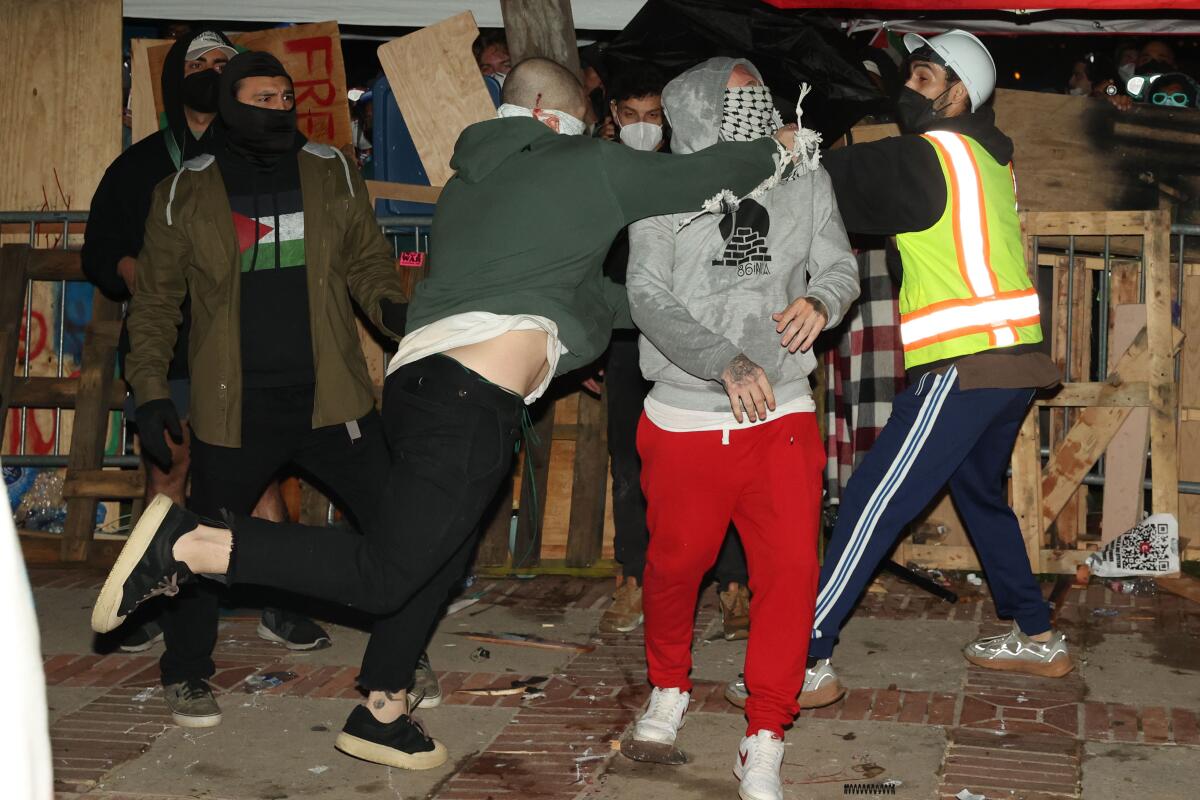UCLA police chief, blasted for security lapses that led to protest violence, is out

- Share via
UCLA Police Chief John Thomas, who was blasted for serious security lapses and failing to protect students during a melee at a pro-Palestinian encampment last spring, has left his job at the university, the campus police department said Wednesday night.
In a post on the social media platform X, the UCLA Police Department said that Thomas’ last day with UCLA was Tuesday. UCLA Police Capt. Scott Scheffler will serve as interim police chief until a permanent chief is selected, the post said.
The post did not elaborate on whether Thomas voluntarily resigned or was fired. Rick Braziel, associate vice chancellor who heads the newly created Office of Campus Safety, informed Thomas after the melee that he would be reassigned while internal and external investigations examined campus security shortfalls. During the violence in early May, UCLA students and others involved in the protest encampment had to fend for themselves against attackers for three hours before law enforcement moved in to quell the disturbance.
Braziel declined to respond to a question Wednesday about whether Thomas was terminated and said he had no statement.
Thomas could not be reached for comment. He told The Times in May that he did “everything I could” to provide security and keep students safe during a week of strife that left UCLA reeling.
He said he advised leadership from the beginning not to allow an encampment because it violated campus rules against overnight camping and he feared it could lead to problems as he assessed other protests sweeping the country.
University leadership, he said, decided to allow the tents “as an expression of students’ 1st Amendment rights” and directed that police not be included in any security plan. He also told The Times he developed a plan that relied on private security and made sure to alert the Los Angeles Police Department of the need to respond immediately should problems arise. Thomas said he provided daily briefings to campus leadership on the latest situation, the number of resources and the response protocol, and assigned roles for those deployed.
In a statement of support for Thomas, the UC police union president said Thursday the university showed a “glaring lack of accountability among UCLA administrators for the disorganized and ineffective response to last spring’s campus protests.”
“The UCLA administration owns the failure of any protest response, and the public should reject their attempts to shift blame to law enforcement,” said Wade Stern, president of the Federated University Peace Officers Assn., which represents more than 250 police officers at the University of California’s 10 campuses.
“Shockingly, only former UCLA PD Chief John Thomas faced consequences, while Chancellor Gene Block retired without accountability, and others remain in leadership,” the statement said. “Chief Thomas, a dedicated leader, deserves far better than to be scapegoated for the administration’s repeated failures and poor decision-making.”
Stern noted that a UC independent review found that UCLA administrators had excluded campus police from some meetings and ordered officers to remain out of sight and to refrain from preventing students from bringing in barriers and equipment for their pro-Palestinian encampment.
UCLA did not immediately respond to the police union statement.
The UC independent review released last month found fault with both administrators and police, concluding that a “highly chaotic” decision-making process, lack of communication among campus leaders and police, and other shortfalls led to institutional paralysis.
The review, conducted by a national law enforcement consulting agency, found that UCLA had no detailed plan for handling major protests, even as problems were “reasonably foreseeable” as encampments at other campuses were drawing violent conflict at times. Campus police had no effective plan to work with external law enforcement and failed to take command on the night of the melee — leading the LAPD and the California Highway Patrol to devise an ad hoc response.
The review recommended how to fix future responses to campus unrest or emergencies. Braziel has begun to address those shortcomings by overhauling UCLA’s security and safety operations.
More to Read
Sign up for Essential California
The most important California stories and recommendations in your inbox every morning.
You may occasionally receive promotional content from the Los Angeles Times.











